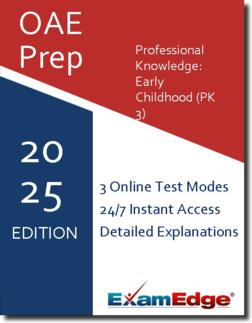OAE Professional Knowledge: Early Childhood (PK-3) (001) Practice Tests & Test Prep by Exam Edge - Topics
Based on 20 Reviews
- Real Exam Simulation: Timed questions and matching content build comfort for your OAE Professional Knowledge: Early Childhood (PK-3) test day.
- Instant, 24/7 Access: Web-based OAE Assessment of Professional Knowledge Early Childhood (PK-3) practice exams with no software needed.
- Clear Explanations: Step-by-step answers and explanations for your OAE exam to strengthen understanding.
- Boosted Confidence: Reduces anxiety and improves test-taking skills to ace your OAE Assessment of Professional Knowledge Early Childhood (PK-3) (001).

Understanding the exact breakdown of the OAE Assessment of Professional Knowledge Early Childhood (PK-3) test will help you know what to expect and how to most effectively prepare. The OAE Assessment of Professional Knowledge Early Childhood (PK-3) has multiple-choice questions The exam will be broken down into the sections below:
| OAE Assessment of Professional Knowledge Early Childhood (PK-3) Exam Blueprint | ||
|---|---|---|
| Domain Name | % | Number of Questions |
| Student Development and Learning | 24% | 24 |
| Assessment, Instruction, and the Learning Environment | 50% | 50 |
| The Professional Environment | 26% | 26 |
| ** Domain II and III contain written assignments | ||


